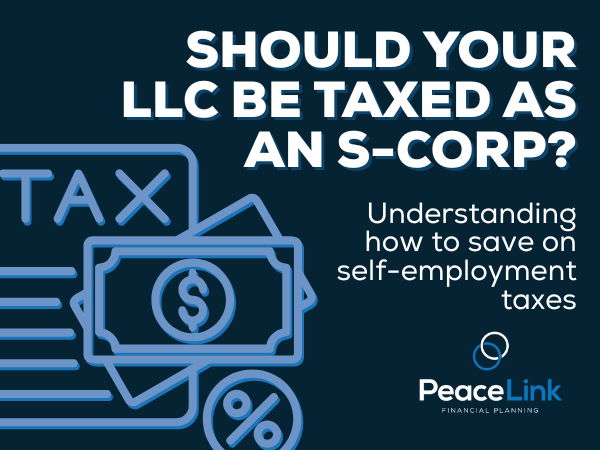
Share this Post
Should Your LLC be Taxed as an S-Corp?
If you’re self-employed, taxes can feel like one big puzzle. Between quarterly payments, deductions, and choosing the right business structure, it’s hard to know what really matters.
One question we hear all the time is: “Should my LLC be taxed as an S-Corp?”
It’s a great question—and one that can have a real impact on your take-home income. Let’s break down what this means and when it might make sense for your business.
An LLC Isn’t a Tax Status
First, let’s clear up a common misconception:
An LLC (limited liability company) is a legal structure, not a tax structure.
Forming an LLC helps protect your personal assets—it keeps your business finances separate from your own. But it doesn’t automatically change how you’re taxed.
By default:
- A single-member LLC is taxed like a sole proprietorship
- A multi-member LLC is taxed like a partnership
In both cases, profits and losses “pass through” to your personal tax return. Simple, yes—but also potentially expensive, depending on how your income grows.
That’s where the S-Corp election can come in.
Why Some Business Owners Choose S-Corp Taxation
The big advantage of an S-Corp is how it handles self-employment tax.
When you’re self-employed, you pay both sides of Social Security and Medicare taxes—what’s called the self-employment tax. It’s about 15.3% on your net income.
If your LLC earns $100,000 in profit, that full amount gets hit with the 15.3% tax under default taxation.
With an S-Corp, though, you can split your income into:
- A reasonable salary you pay yourself (like a W-2 employee)
- Distributions, which are profits you take as the owner
You pay self-employment tax only on the salary portion—not on the distributions.
Example:
If you pay yourself a $60,000 salary and take $40,000 as a distribution, you’ll pay self-employment tax on the $60,000 only.
The remaining $40,000 avoids that extra 15.3%—potentially saving you around $6,000.
What Counts as a “Reasonable Salary”
The IRS expects your salary to reflect what someone in your role would reasonably earn.
If most people in your field make $60,000, you can’t just pay yourself $10,000 to dodge taxes. But you also don’t have to pay yourself at the very top of the range. The goal is balance—a salary that makes sense for your role while still leaving room for profit distributions.
The Tradeoffs: Savings vs. Complexity
S-Corp taxation can definitely create tax savings—but it’s not right for everyone. It comes with some extra steps and costs, including:
- Setting up and running payroll
- Filing quarterly payroll reports
- Submitting a separate corporate tax return
- Possibly higher accounting or tax prep fees
These added costs often make S-Corp status most worthwhile once your business is generating enough profit for the tax savings to outweigh the administrative expenses.
If you’re still in the early growth stage, sticking with your default LLC structure may be simpler and more cost-effective for now.
Making the Right Call
There’s no one-size-fits-all answer here. The right structure depends on your income level, goals, and how your business is evolving.
The best next step is to run the numbers with a CPA or financial planner who understands small business taxes. They can show you exactly how each setup would affect your tax bill—so you can make a confident, informed choice.
At PeaceLink, we help self-employed professionals and realtors make these decisions every day. Whether you’re just getting started or ready to fine-tune your business finances, we want you to have the clarity and confidence to build the life you’re working toward.
Check Your Financial Health
If you’re curious how your current setup is working for you, take our quick Self-Employment Financial Health Check.
It’s a simple, 2-minute quiz that highlights key areas of your business finances—so you can see what’s working well and where a few smart changes could make a big difference.
Key Takeaway:
An LLC taxed as an S-Corp can be a smart way to reduce self-employment taxes—but it’s not the right fit for everyone. Understanding your income, goals, and long-term plans is the best way to decide which structure will help you build a stronger financial foundation.
